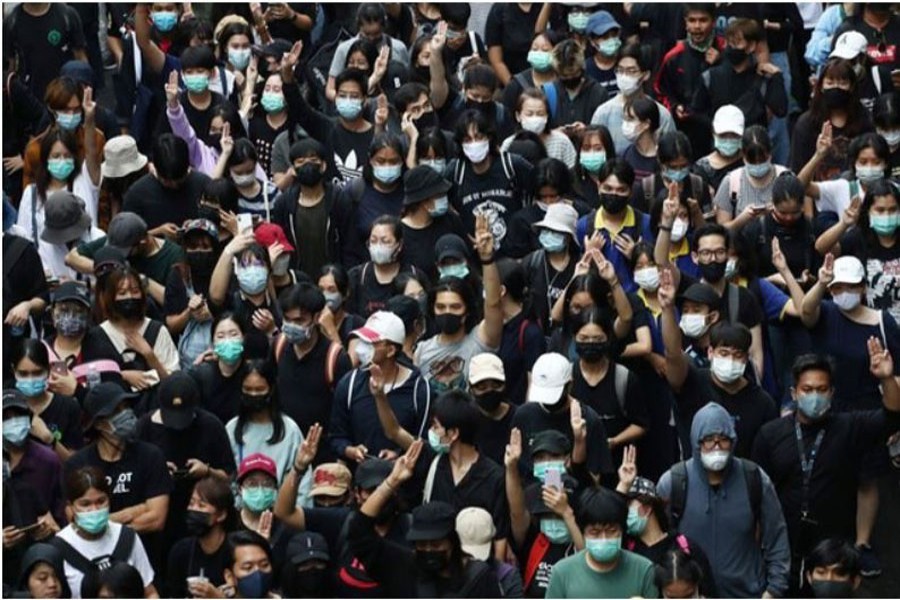Angry Thai youths seem to be in a defiant, determined mood despite the government's declaring a state of emergency slapping a ban on any assembly of more than five and restricting publication of news or online messages that the government thinks might harm national security. Undaunted, the youths demonstrating to, what they claim, restore democracy are still gathering at different spots of Bangkok in what looks like a game of cat and mouse to outmanoeuvre the police. Even though the government has warned of tougher measures like clamping down on the demonstrations by ordering a curfew, the students and youths have continued their protests all the same. The youths are still on the street.
Last week the Thai youths had their largest protest rallies before the Democracy Monument, breached police barricade in their bid to gather before the Government House and even jeered at the passing royal motorcade giving 'three-finger salute' à la-- 'The Hunger Games' of Hollywood movie fame. The government of Prime Minister Prayut Chan-o-cha, however, considered it a threat to the monarchy and issued the emergency decree.
They are showing no sign of giving up even in the face of arrest of more than 50 people including some 20 or more movement leaders so far and the government's deploying more members of the security forces.
Now the question is why they are angry and what brought them to the street. This unrest was originally triggered by the dissolution of a newly formed opposition party, the Future Forward Party (FFP), led by a businessman turned politician, ThanathornJuangroongruangkit, by Thailand's constitutional court on grounds of taking donation.
Though a new political outfit, it garnered huge support among the young voters. In the March 2019 election, it clinched the third place grabbing one third of the parliamentary seats.
The youths began protesting as they saw the 2017's constitution that empowered the court to disband FFP as a roadblock to democracy. In fact, the incumbent prime ministerPrayut Chan-o-cha, who originally took power through a coup d'état in May 2014 ousting the then caretaker government of YingluckShinawatra, has been consolidating his power since then.
The same constitutional court's ruling that first removed YingluckShinawatra from her office actually cleared Prayut Chan-o-cha's path to power through the inevitable coup. And after last year's election, he had no problem getting the needed majority as he had already 250 appointed senators in the upper house in his favour.
So, the demonstrating youths want his resignation, amendment to or even redrawing of the constitution that facilitated his becoming prime minister and curtailing the power of the monarch, (or carrying out reform to make him king under the constitution with limited power) whose endorsement the prime minister enjoys. And the youths also generally do not approve of the present monarch, King MahaVajiralongkorn because of, what many say, his hedonistic and spendthrift lifestyle. As the reports go, the king most of the time resides in Bavaria of Germany. Strangely enough, this is for the first time ever in Thailand that an accusing finger has been pointed at the monarchy, the nation's most revered institution so far.
Student's movement, or rather the youth's, is not something new in Thailand. In the past whoever was in power whether by coup or through election found the economy going strong under their rule. But not now. The economy under Prime minister Prayut Chan-o-cha's government has been struggling behind many of its successful neighbours.
The present agitating youths are the millennials who want to see their country progressing fast. They want to succeed in their own lives. As first-time voters in March 2019's election, they feel aggrieved. The monarchy, to these youths, is part of the old establishment. They want change. But the old establishment of the military, the judiciary, the bureaucracy and the monarchy is still strong.
The youth movement is still Bangkok-based and is yet to become a national one. Even so, observers think time has changed and the old ways will have to give way to the new.


